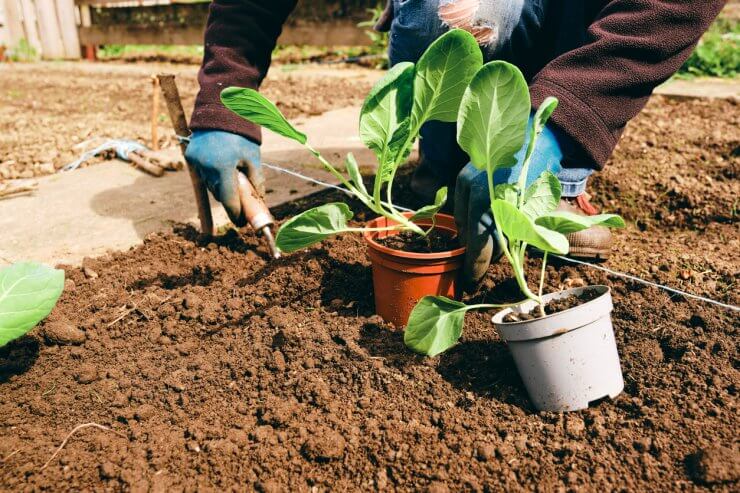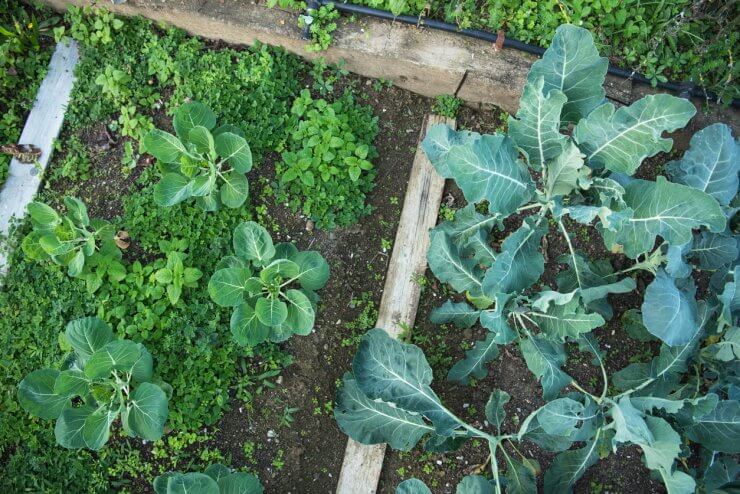
Brussels Sprouts being planted in great soil
Healthy plants need healthy soil. Brussels sprouts are heavy feeders, and they like firm, nutritious, nitrogen-rich soil. The best strategy for having the soil ready for your Brussels sprouts is to test the soil the season before; Brussels sprouts like soil that’s slightly acidic to neutral, with a pH between 6.5 and 7.0.
The soil should be firm, fertile, well-drained, and rich with organic matter; this is why it’s great to have your own compost bin/heap. Best practice for Brussels sprouts is to amend the soil the season before and let the land rest for four to six months before planting. You can do that with any gardening setup, really—even containers.
It’s OK if you don’t make your own compost—you can buy bulk compost from most gardening supply stores. Try to find “certified compost” with the U.S. Composting Council’s Seal of Testing Assurance (STA)—their rigorous testing process and standards will ensure you get quality compost.
Next, because you know Brussels sprouts are heavy feeders, find a timed-release fertilizer that you can use throughout the growing season. Worm castings are also healthy amendments to your soil; if you’re feeling really ambitious, you could take up vermicomposting to fortify your garden. But that, of course, means you need to take care of your worms, too.
Remember, soil health is essential to growing healthy, productive plants. Give your Brussels sprouts a fighting chance and get their soil ready ahead of time.
Companion planting allows plants to share space and provide some benefit to each other. Rule #1: Don’t plant crops of the same category together. Since all cruciferous plants (cabbage, Brussels sprouts, broccoli, kale, etc.) are a favorite target of the same pests, you want to plant something else near your Brussels sprouts to reduce the risk of pest infestation.
There are several benefits to companion planting:
- Repel insect pests
- Attract beneficial insects
- Improve soil quality
- Encourage growth or improve taste
- Provide ground cover
- Provide shade
When it comes to companion planting with Brussels sprouts, here are some plants that Brussels sprouts like to share space with. Be sure to give your Brussels sprouts plenty of space of their own, but you can plant these nearby:
- Basil
- Mint
- Marigolds
- Nasturtiums
- Beets
- Bush beans
- Carrots
- Celery
- Lettuce
- Onions
- Peas
- Potatoes
- Radishes
- Spinach
- Tomatoes

Segregate your Brussels sprouts from other Brassicas
And here is a list of plants to keep away from your Brussels sprouts:
- Strawberries
- Other Brassicas
- Kohlrabi
- Pole beans
There is one Brassica exception to companion planting with Brussels sprouts. You can plant mustard as a trap crop. The mustard will attract the pests that usually like to chow down on the Brussels sprouts. When you see the pests attacking the mustard plant, dig it up and remove it. Sound a little harsh? It’s a better approach than using insecticide if you don’t have to.
What type of soil do you use to grow your Brussels sprouts? Do you use compost at all? What are your best tips for creating optimal soil for your Brussels sprouts? Please share your techniques with us.


 Previous
Previous

